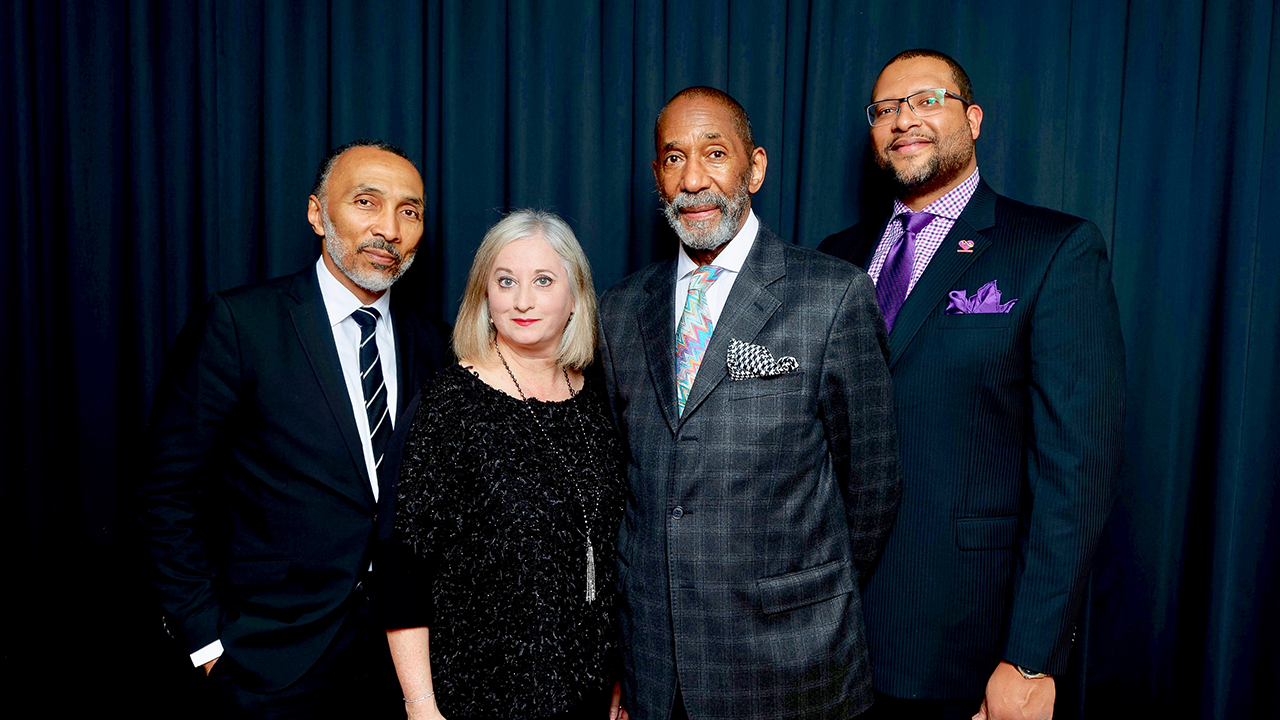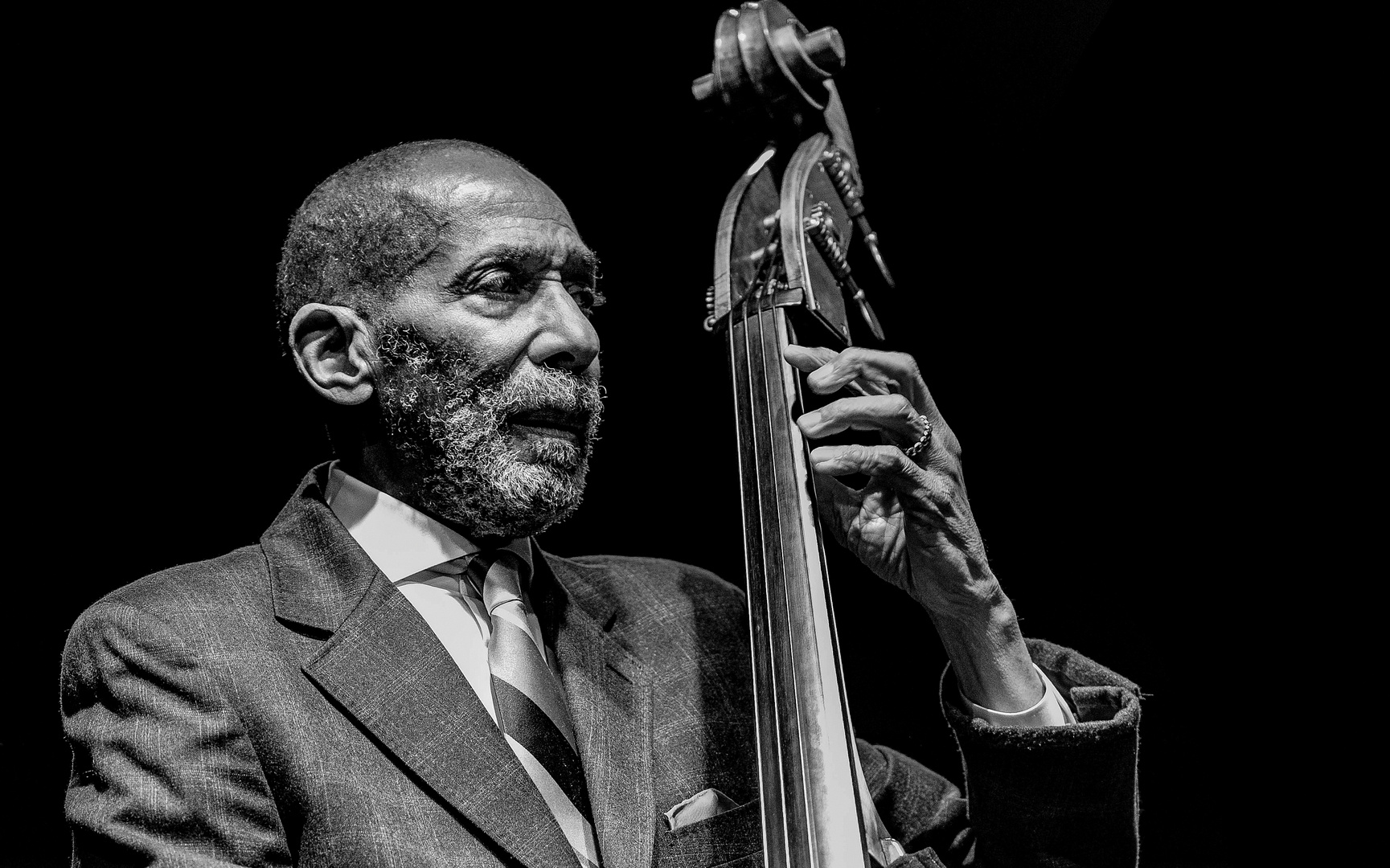 |
| Payton Crossley, Rene Rosnes, Ron Carter & Jimmy Greene |
I DIG JAZZ
A jazz reporter's notebook...
Saturday, April 5, 2025
DID THE RON CARTER FOURSIGHT QUARTET PUT ON THE BEST CONCERT IN THE HISTORY OF THE PARADISE JAZZ SERIES?
Monday, March 24, 2025
TRUMPETER BENNY BENACK III LAUNCHES FIRST MIDWEST JAZZ COLLECTIVE CONCERT AT THE BLUE LLAMA
 |
| Trumpeter Benny Benack III |
Benny Benack III, a jazz
trumpeter from Pittsburgh, reminds me of the late Chet Baker with his trumpet
and singing style. I don't know if he means to copy Baker, or if he looks up to
him. Benack has played with stars like Christian McBride and Emmet Cohen and released two albums. When I heard Benack sing and blow Saturday
night, I could not stop thinking of Baker during his heyday. However, Benack sings better than Baker did. Benack III performed with his band,
including pianist Tyler Henderson, drummer Charles Goold, and bassist Caleb
Tobocman. They were there to start a new concert series by the Midwest Jazz
Collective, a group of jazz clubs and promoters in the Midwest that organize
tours for leading jazz musicians. Benack III had performed at Blue Llama before
and even recorded a live album there last year, set for release this summer. The
band played standards and originals, starting with "Kiss the Good Life
Goodbye" and then "The Sound of Music." The band sounded best on songs from Benack's
albums “Third Times The Charm,” “One of a Kind,” and “A Lot of Livin’ to Do.”
Benack's singing was soothing, making you wish he would never stop. His
pianist, Tyler Henderson, a Juilliard graduate, played perfectly behind him,
demonstrating how selfless a pianist must be when supporting a singer. During
the 90-minute performance, it was surprising to see that Benack, who has such a
smooth singing voice, could also play the trumpet so powerfully. He showed this, especially on the song “Catching Drift,” which was a twist on “My Favorite
Things.” Here, Goold and Tobocman really carried the heavy parts. Tobocman,
only twenty-two, is already making a name for himself. Throughout the set, he
strolled with his bass rather than walking it. Goold's drumming was powerfully
beautiful, like his peers Nasheet Waits and Brian Blade. At the end of the set,
Benack III invited a singer friend to join him for a restructured take of
“Willow Weep for Me,” ending the show beautifully and marking a great start for
the Midwest Jazz Collective's concert series.
Wednesday, March 19, 2025
WJZZ CELEBRATES ITS 66TH BIRTHDAY AT BAKER’S KEYBOARD LOUNGE
 |
| WJZZ's Rodger Penzabene Jr. |
WJZZ
celebrated its 66th birthday with an exclusive party Tuesday night at Baker's
Keyboard Lounge in Detroit, MI, which included a guest list of notable Detroiters
like fashion laureate Chuck Bennett, renowned photographer Monica Morgan, fashionista
Fast Freddy Anderson, jazz vocalists Naima Shamborguer, Sky Covington, Joan
Belgrave, celebrity journalist Greg Dunmore, and some elected city officials. The
drummer and Kresge Fellow Aisha Ellis and her quartet provided the music. Before
the quartet launched the two-hour performance with tracks from Ellis’s new
album "Luck or Favor," WJZZ's president, Rodger Penazbene Jr.,
thanked his sponsors and team for organizing the celebration and shared
insights into the station's history and its new direction. He then handed the
stage back to Ellis's group, whose performance mixed funk and smooth jazz. This
style of music, although different from what I usually write about here, aligns
with WJZZ's shift from traditional acoustic jazz. The quartet included
keyboardist Jame Shelton, bassist William Pope II, and flutist Deblon Jackson
played most songs in the same key and at a lively pace, captivating the
audience and even me at times. It has been a while since I last visited Baker's.
I was a regular at the late pianist Teddy Harris Jr.'s weekly jam sessions
years ago. It is surprising that Baker's no longer has a piano, especially
since it is known as the world's oldest jazz club—a claim disputed by some jazz
historians. During the celebration, I found myself—despite my allegiance to
straight-ahead acoustic jazz—lost in the music along with everyone else. Ellis
is a witty and exciting drummer, reminiscent of Gaylynn McKinney in her
textured rim shots and self-assurance in the pocket, shouldering the bulk of
the workload. Jackson, on the flute, was exceptional, though sadly unsung
despite her long history of putting out good music. I only hear her play at her
annual street performances during the Detroit Jazz Festival. Her talent is
remarkable, and I wonder why the festival has not booked her or she has not
been featured at any of the jazz clubs in Detroit. Shelton, the keyboardist,
played energetically, though his rambunctious style made his bandmates labor
harder than they should have at times. Halfway through the set, Ellis was sweating
like a construction worker on a hot August day. Shelton might have forgotten he
was not leading the quartet. Over the years, I have come to understand that
smooth jazz keyboardists are prone to grandstanding. It is an unshakable part of
their nature. Overall, the 66th birthday bash was a perfect tribute
to WJZZ, an important part of Detroit's cultural scene. There is good reason to
cheer Rodger Penzabene Jr. for his dedication to revitalizing WJZZ.
Sunday, March 16, 2025
YOU DON’T HAVE TO EXPERIENCE AN ENTIRE WILLIAM HILL III CONCERT TO KNOW HE’S THE REAL DEAL
 |
| Pianist William Hill III |
I owe the young jazz
pianist William Hill III a heartfelt apology for only staying for half his trio
set Friday evening at the Friday Night Live concert series at the Christ Church
Cranbrook. Hill’s trio includes drummer Samuel Melkonian and bassist Langston
Kitchen. Hill is a Detroit School of the Arts graduate who now studies at the
Manhattan School of Music and performs regularly around New York. I left midway
through the set because my partner’s seasonal allergies flared up, causing her
eyes to swell. Fortunately, the four compositions I heard convinced me that after
hearing him for the first time as part of the Detroit Jazz Preservation concert
series, my initial impression of him as a force to be taken seriously was
accurate. His trio opened Friday night with his original “Keep It Moving,” showing
he’s a gifted composer, and the trio is as polished as any professional trio currently
working. They followed the opener with a hip take of Thelonious Monk’s classic
“’ Round Midnight.” Pianistically, he runs lines with the sophistication and
aplomb of a veteran sharpshooter like Cyrus Chestnut, and Hill possesses the
piss-and-vinegar swagger of the late Jaki Byard, who could touch on the history
of African American music in a single solo. Hill denies that Chestnut and Byard
weren’t immediate influences. He attributes that to Wynton Kelly and Oscar
Peterson. After the trio’s modernized rendering of the Monk classic, Hill cast
the spotlight on bassist Langston Kitchen on the goose-bump-inducing “Alone
Together.” Kitchen has a mean left hook and his soloing on the tune was awe-inspired.
Melkonian drumming could’ve made the devil blush. Hill didn’t announce how long
his trio had been together. The trio is professional from top to bottom. I
appreciated that William required his bandmates to wear suits. He understands
the significance of first impressions. So many of his peers don’t care how they
look on stage, but not Hill. He treated the bandstand as if it were sacred
ground. I hated that I couldn’t stay for the entire concert, but what I
experienced was top-notch enough to convince me the sky is the limit regarding Hill’s future.
Monday, March 10, 2025
THE DETROIT JAZZ PRESERVATION CONCERT SERIES SHOWS ANOTHER SIDE OF JAZZ BASSIST RON CARTER
 |
| Ron Carter |
Whenever jazz bassist Ron
Carter comes up in conversation, it often centers on his numerous achievements,
such as his contributions to over 2,000 recordings, his decades as a leading
jazz educator, and his membership in Miles Davis’s second iconic quintet.
However, fans and critics seldom discuss him as a composer. His compositions
took center stage on Sunday evening at the Detroit Jazz Preservation Concert
Series in Schaver Music Recital Hall. Trombonist Vincent Chandler, the series
founder, chose nine of Carter’s compositions and assembled a cross-generational
band that included pianist Gregory Burk, drummer Louis M. Jones III, bassist
Michael Abbo, saxophonist Vincent Bowens, and percussionist Mahindi Masa. The
evening began with Carter’s “Uptown Conversation." Although it’s an upbeat
piece, the band didn’t allow its nuances to overwhelm the audience. The various
bands Chandler has assembled for the DJPS seldom rehearse the music they
present. That’s hard to tell and shows the elevated level of musicianship in
Detroit that Chandler is helping cultivate. Next, the band performed one of
Carter’s ballads, “3 More Days," with patience and warmth, and it’s
doubtful that there was a dry eye in the hall when the band finished. In all
the years I’ve followed Chandler, this was the first time I remember hearing
him perform a ballad. It felt like a love letter to the audience. Chandler was
in top form during the concert. As the leader, I’ve never seen him focus the
spotlight solely on himself; he’s about laying the groundwork and encouraging
his bandmates to build upon it. However, he did mention something that annoyed
me while providing context about his touring stint with the Jazz at Lincoln
Center Orchestra, implying he isn’t on the same level as trombonist Wycliffe
Gordon, who Chandler subbed for in the JLCO. Of course, Chandler was being
modest, but I know his chops and feel confident in asserting that he is in the
same league as Gordon or any prominent jazz trombonist performing today. This
time, his standout selection was the veteran saxophonist Vincent Bowens, who
has the softest tone of any professional tenor player I’ve ever encountered.
When Bowens soloed on “Aromatic” and “Fill in The Blanks,” I felt his tenor sax
might float out of his hands at any moment. Bowens is neither average nor
overly muscular as a saxophonist; sophistication is his trademark. The rest of
the band was marvelous as well. Burk is a sophisticated pianist who follows the
tradition of Kenny Barron. He doesn’t believe in taking out his aggression on
the piano and has a light touch as if feathers are attached to his fingertips.
Abbo was a crowd favorite, walking his bass like a prom date. When he performed
on Carter’s “Little Waltz” and “117 Special,” I understood Chandler’s affinity
for him. His style resembles bassist Josef Deas, who played with Chandler in
the popular jazz ensemble Urban Transport. And for such a young drummer, Jones
III displays a remarkable command of the kit. His solos are concise and
impactful. Listening to his drumming, I wondered if his biggest inspirations
were drummers Bert Merrick and Sean Dobbins. What stands out most about this
incredible concert series is the respectful handling of the music presented.
Monday, February 24, 2025
AT THE PARADISE JAZZ SERIES, THE SFJAZZ COLLECTIVE PRESENTS AN ORIGINAL SUITE IN SEVEN MOVEMENTS
 |
| The SFJAZZ Collective |
The SFJAZZ Collective, an
all-star ensemble, commemorated 20 years of music on Saturday night at the
Paradise Jazz Series with a commissioned suite in seven movements. Since its
inception in 2004, the collective has featured renowned jazz musicians,
including Joshua Redman, Sean Jones, Rene Rosnes, and Bobby Hutcherson. The
collective has showcased music from the great American songbook, pop songs, and
original works by various members. For the Paradise Jazz Series presentation,
the group performed a suite in which vibist Warren Wolfe, saxophonists David
Sanchez and Chris Potter, pianist Edward Simon, trumpeter Mike Rodriguez,
bassist Matt Brewer, and drummer Kendrick Scott contributed individual
movements. The suite could have felt disjointed with so many hands in the pot,
with one or two movements overshadowing the others. However, that wasn’t the
case here. All seven movements were equally captivating, featuring standout
solos by Wolfe and Potter. The 90-minute concert was my first time hearing
Potter live. I’m familiar with his studio recordings, but there’s nothing like
witnessing the gunslinger perform live with similarly skilled musicians. Potter
embodies a massive tone on the tenor saxophone, drawing you in just a few
choruses into one of his gorgeous solos. On Saturday night, he was the crowd
favorite. This was the first live concert I attended, where every moment felt
like it could make the highlight reel. This performance was undeniably better
than the last time the group performed at the Paradise Jazz Series, where they
played music by Michael Jackson. That was my least favorite jazz concert of all
time. The reason being, there’s nothing sadder than a group of jazz musicians playing pop
music—that’s more than my jazz purist heart can bear. This time, the collective
was masterful in presenting the seven-movement suite, making it a fitting way
to celebrate 20 years of swinging at the highest level.
Thursday, February 20, 2025
THE BRANFORD MARSALIS QUARTET DEBUTS AT THE UMS CONCERT SERIES
 |
| Branford Marsalis, Justin Faulkner, Eric Revis & Joey Calderazzo |
On Wednesday night at the
Michigan Theatre in Ann Arbor, MI, the Branford Marsalis Quartet debuted in the
University Music Society concert series. As I enjoyed one of the best jazz
bands around, I couldn’t help but wonder why it took the UMS organizers so long
to bring Marsalis, pianist Joey Calderazzo, bassist Eric Revis, and drummer
Justin Faulkner to town. The quartet performed hits from past recordings and
their upcoming Blue Note Records debut, “Spiral Dance," as if being part
of the series was a top priority on the quartet’s vision board. Unfortunately,
Marsalis did not discuss the new recording. The quartet has been together for
about 30 years, with just one personnel change: Justin Faulkner took over for
Jeff “Tain” Watts in 2009. Faulkner quickly emerged as the guiding light of the
quartet. His drumming on Wednesday was soul-stirring. The quartet began the
90-minute set with Calderazzo’s burner “The Mighty Sword.” Right from the
start, one could sense the band’s cohesion and their ability to comfortably
explore the nooks and corners of each other’s musical psyches. Marsalis is the
pilot, but by the time the quartet powered through Keith Jarrett’s “Long as You
Know You’re Living Yours” and Paul Whiteman’s “There Ain’t No Sweet Man Worth
the Salt of My Tears,” it became clear that Calderazzo and Faulkner are more
than just the band’s copilots. Their chemistry is unmatched. Often, they get so
fired up that one might easily mistake their back-and-forth trading for
showboating. In reality, it’s simply two professional swingers doing what
swingers do: satisfying the cravings of an audience eager for great jazz. Rest
assured, no one left with an empty belly after the quartet finished performing.
It’s easy to become entranced watching Calderazzo’s hands race across the piano
keys and his feet flop like a fish out of water. The individual play on Revis’s
“Love/Stranger,” which Marsalis jokingly called Revis’s take on a modern love
song, was the highlight of the set. Each member soloed as if it were the last solo
they would ever play. Revis writes eccentric songs, and Marsalis often
playfully teases him about them. At a Paradise Jazz Series concert several
years ago, Marsalis described one of Revis’s abstract songs, telling the
audience that this is the kind of music you play when you don’t want to get
paid. What’s interesting about Revis’s songs is their complexity, which allows
musicians to expand their virtuosity. Marsalis paraded the breadth of his chops
on this number with a controlled intelligence he has cultivated over time.
Marsalis’s quartet delivered an outstanding debut, which is no surprise. The
UMS organizers should consider bringing the quartet back to the series at least
every other year.